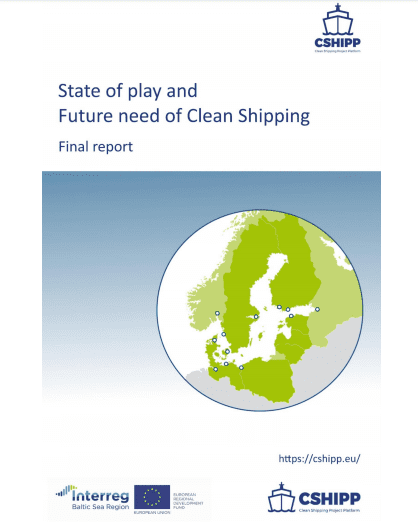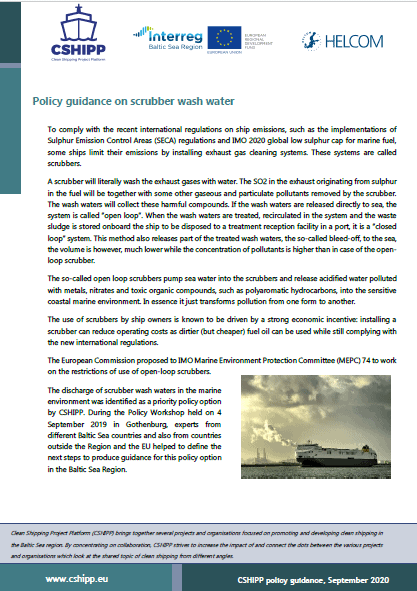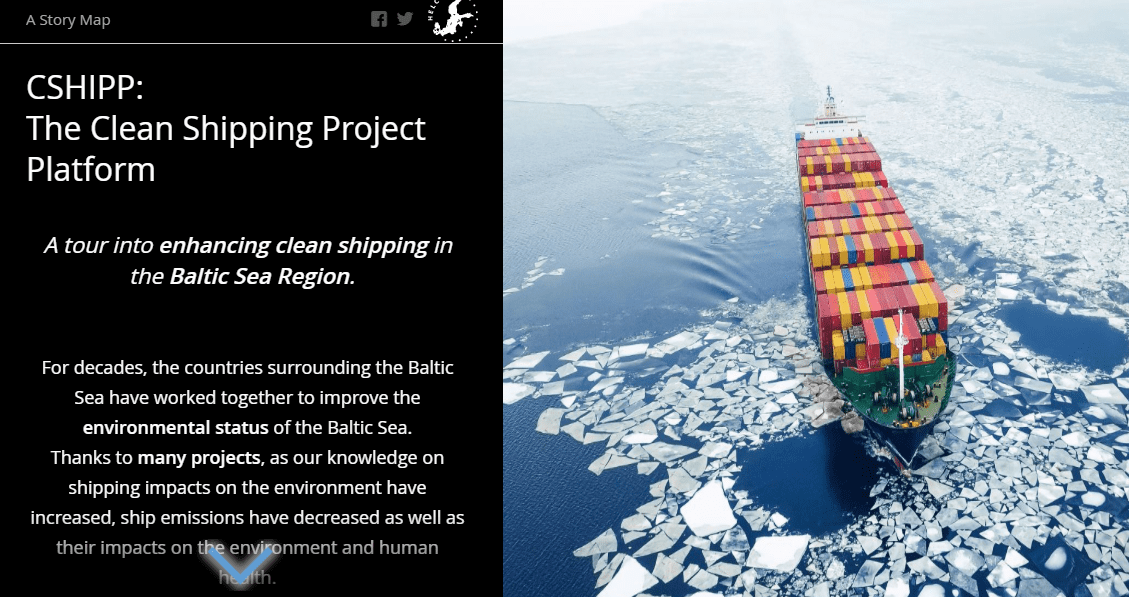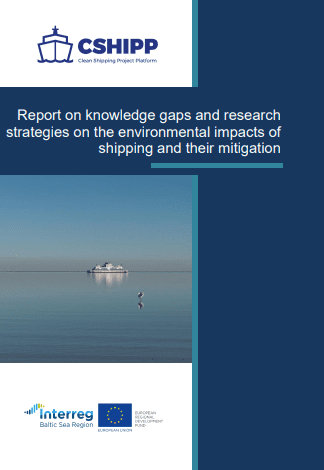CSHIPP
Cross-sectoral dialogue for increased capacity of maritime actors
The Baltic Sea region is a frontrunner in clean shipping. The gap between research, business and policy-making, however, hinders further and faster development of the field. The Interreg Clean Shipping Project Platform addressed this challenge by bringing together research, business and policy-making actors into a dialogue with each other in events and workshops. By showcasing the results of several projects working with these themes, the CSHIPP also triggered new ideas and synergies. Last but not least, CSHIPP is also a strong voice for the valuable work done in projects which would not be possible without EU funding.
Clean shipping projects synthesising their know-how
CSHIPP brought together projects and organisations that focused on enhancing clean shipping in the Baltic Sea region. The objective was to increase the impact of and connect the dots between the several projects working for clean shipping: as the involved projects look at the topic from different angles, CSHIPP synthesised the projects’ results to give a holistic outlook in a concise and easily comprehensible format.
Environmental performance and business potential go hand-in-hand
CSHIPP activities revolved around two key themes: (1) the environmental effects of shipping in the BSR and (2) the business potential of clean shipping in the Baltic Sea region. By discussing these themes both separately and simultaneously, CSHIPP underlined that environmentally friendly shipping and profitable business are not exclusionary but, in fact, support one another.
Projects represented in this platform:
- Interreg Baltic Sea Region: EnviSuM | Baltic LINes | Go LNG | ECOPRODIGI | BSR electric | COMPLETE
- BONUS: SHEBA
- Connecting Europe Facility: CompMon
Budgets
in numbers
-
1.08MillionTotal
-
0.69MillionErdf
-
0.09MillionEni + Russia
-
0.04MillionNorway
Achievements
Joint work on clean shipping
The CSHIPP project platform synthesised knowledge on how to reduce the environmental effects of shipping, make shipping cleaner, and enhance its business potential. The partners focused on the results of the Interreg Baltic Sea Region projects and enriched the synthesis with the outcomes from projects of the BONUS research programme and the Connecting Europe Facility.
A compilation of promising technologies
The partners compiled the technologies and policy measures to reduce harmful emissions and decarbonise the maritime industry and introduced them to the shipping industry, policy makers and national authorities in the Baltic Sea region.
Alternative fuels and energy sources, such as hydrogen, ammonia, electricity and biofuels, could provide viable options for decreasing harmful emissions from shipping. Emission abatement technologies such as scrubbers could help remove particulate matter and harmful components including sulphur oxides and nitrogen oxides from exhaust gasses of ships. New technologies and digital solutions could make it possible to monitor vessel performance, discover inefficiencies and streamline processes to reduce energy consumption, emissions and waste. Finally, policies and regulations, such as emissions control areas, could govern and guide the maritime industry towards cleaner choices and practices.
Uplifting clean shipping policies
CSHIPP also supported the policy process in the shipping sector. Based on the policy recommendations from the participating projects and further discussion with the regional authorities, the partners formulated two priority policy options to ensure clean shipping: scrubber wash water and onshore power development. Together with the HELCOM Maritime working group, the partners identified the next steps toward developing future HELCOM recommendations for clean shipping in the Baltic Sea area. In addition, the platform partners cooperated intensely with the coordinators of the EUSBSR policy area Ship in the policy work.
All in all, the CSHIPP platform strengthened the dialogue among researchers, policy-makers, and maritime industry to advance clean shipping in the region.
Outputs
State of play and future needs of clean shipping

Policy guidance on scrubber wash water and the development of shore power at ports

A story map: a tour into enhancing clean shipping in the Baltic Sea Region

Best practices in clean shipping financing in Europe

Knowledge gaps and research strategies on the environmental impacts of shipping and their mitigation

Project Stories
-
03.08.2021
Low-carbon mobility solutions to green our future
In line with the EU’s climate neutrality target, our Programme supported several initiatives tackling the diverse challenges faced by the Baltic Sea region’s transport sector. We united our efforts to make our region more accessible, better connected and less polluted, ultimately improving the overall mobility experience in the area while protecting the environment. Read how Interreg Go LNG, BSR electric and Sohjoa Baltic have contributed to green mobility and innovation in transport sectors in the region.Read full story -
14.04.2021
Interreg fights aliens in the Baltic Sea
At any moment in the Baltic marine area, about 2,000 ships are transporting people, goods, but also stowaways: marine organisms from distant places, like Harris mud crabs, that colonise the Baltic Sea waters. The Interreg project COMPLETE brought together people with smart ideas how to translate the existing regulations into a working system to prevent alien species from invading the Baltic Sea.Read full story -
15.07.2019
Coherent planning of shipping and offshore energy across borders with Baltic LINes
The Baltic Sea experiences an increasing demand for coherent spatial planning in order to bring shipping routes and offshore renewable energy infrastructure together. Project partners from nine countries worked across borders to tackle the challenge of scarce space available and competing economic interests of the different sectors active in and around the Baltic Sea in the Interreg project Baltic LINes.Read full story -
21.12.2016
EnviSuM study in Gothenburg proves sulphur emissions reduced by 70%
The Sniffer is a measuring station located at the entrance to the port of Gothenburg, the partners of the EnviSuM project use to remotely measure emissions of ships passing by. Following the introduction of the Sulphur Emission Control Area (SECA) regulations, a recent study by EnviSuM revealed that the port of Gothenburg experienced a major reduction in sulphur emissions by 70 % in only a year.Read full story
Partners
University of Turku
- TownTurku
- RegionVarsinais-Suomi
- CountryFinland
- RepresentativeRiitta Pöntynen
- Phone
- E-Mail
- Web
Centrum Balticum Foundation
- TownTurku
- RegionVarsinais-Suomi
- CountryFinland
- RepresentativeKirsi Ahlman
- Phone
- E-Mail
- Web
Finnish Meteorological Institute
- TownHelsinki
- RegionHelsinki-Uusimaa
- CountryFinland
- RepresentativeJukka-Pekka Jalkanen
- Phone
- E-Mail
- Web
IVL, Swedish Environmental research Institute
- TownGothenburg
- RegionVästra Götalands län
- CountrySweden
- RepresentativeJana Moldanova
- Phone
- E-Mail
- Web
Baltic Marine Environment Protection Commission - Helsinki Commission (HELCOM)
- TownHelsinki
- RegionHelsinki-Uusimaa
- CountryFinland
- RepresentativeFlorent Nicolas
- Phone
- E-Mail
- Web
Norwegian Meteorological Institute
- TownOslo
- RegionOslo
- CountryNorway
- RepresentativePer Helmer Skaali
- Phone
- E-Mail
- Web
Chalmers University of Technology
- TownGothenburg
- RegionVästra Götalands län
- CountrySweden
- RepresentativeJohan Mellqvist
- Phone
- E-Mail
- Web
Tallinn University of Technology
- TownTallinn
- RegionPõhja-Eesti
- CountryEstonia
- RepresentativeGunnar Prause
- Phone
- E-Mail
- Web
Helmholtz-Zentrum Geesthacht Centre for Materials and Coastal Reseach
- TownGeesthacht
- RegionHerzogtum Lauenburg
- CountryGermany
- RepresentativeVolker Matthias
- Phone
- E-Mail
- Web
ATI Küste GmbH - Association for Technology und Innovation
- TownRostock
- RegionLandkreis Rostock
- CountryGermany
- RepresentativeAlexander John
- Phone
- E-Mail
- Web
Maritime University of Szczecin
- TownSzczecin
- RegionMiasto Szczecin
- CountryPoland
- RepresentativeTadeusz Borkowski
- Phone
- E-Mail
- Web
MDC (Maritime Development Center)
- TownCopengagen
- RegionByen København
- CountryDenmark
- RepresentativeJan Boyesen
- Phone
- E-Mail
- Web
Aalborg University
- TownKøbenhavn S
- RegionByen København
- CountryDenmark
- RepresentativeNiels Gorm Malý Rytter
- Phone
- E-Mail
- Web
The St. Petersburg House Property Owners Association
- TownSt. Petersburg
- RegionCity of St. Petersburg
- Country
- RepresentativeNikolai Pitirimov
- Phone
- E-Mail
- Web
-
Project managerRiitta PöntynenUniversity of Turku
-
Legal representativeEsa HämäläinenUniversity of Turku
-
Financial managerMirja JyrkinenUniversity of Turku
-
Communication managerEmilia TuominenCentrum Balticum Foundation



